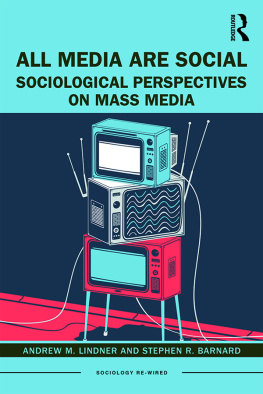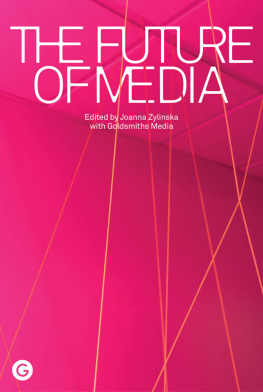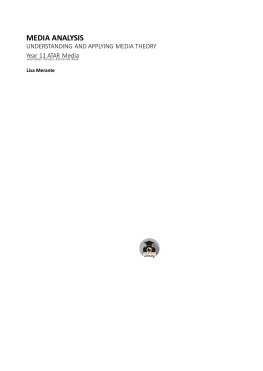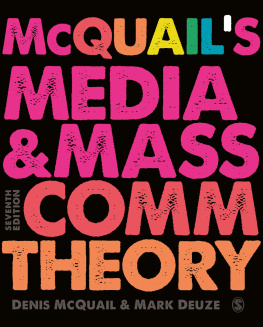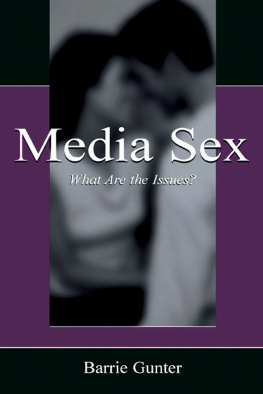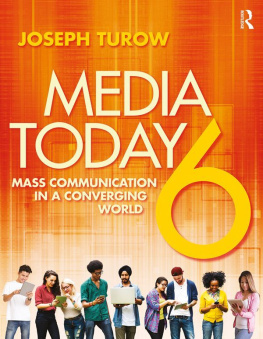
Thinking Media and Beyond
Mediaold or new, in the cloud or undergroundconstitutes the very condition in which our world takes shape. Media is reshaped continuously, marked for both the profound effects it produces and the acceleration it exhibits. It is the medium through which we signal some of the most pressing issues we face in our ever-widening technologized world.
Written by authors working at the forefront of media theory today, this book charts an original and compelling path across various media forms, bringing to light the wonderful yet persistently unsettling role that media plays, and will continue to play, in the evolution of our future. It not only establishes media as a serious and interdisciplinary concept but also demonstrates how this concept can be developed beyond the current limited form and content dichotomy.
This book was originally published as a special issue of Cultural Studies.
Briankle G. Chang teaches Cultural Studies and Media Theory and Philosophy at the University of Massachusetts, USA. He is the author of Deconstructing Communication: Subject, Representation, and Economies of Exchange (1996) and coeditor of Philosophy of Communication (2012).
Florian Sprenger is Professor for Media and Cultural Studies at Goethe University, Germany. He is the author of Politics of Micro-Decisions: Edward Snowden, Net Neutrality and the Architecture of the Internet (2015). His research covers topics such as the history of artificial environments and the media of immediacy.
First published 2018
by Routledge
2 Park Square, Milton Park, Abingdon, Oxon, OX14 4RN, UK
and by Routledge
711 Third Avenue, New York, NY 10017, USA
Routledge is an imprint of the Taylor & Francis Group, an informa business
2018 Taylor & Francis
All rights reserved. No part of this book may be reprinted or reproduced or utilised in any form or by any electronic, mechanical, or other means, now known or hereafter invented, including photocopying and recording, or in any information storage or retrieval system, without permission in writing from the publishers.
Trademark notice: Product or corporate names may be trademarks or registered trademarks, and are used only for identification and explanation without intent to infringe.
British Library Cataloguing in Publication Data
A catalogue record for this book is available from the British Library
ISBN13: 978-1-138-50506-3
Typeset in Myriad Pro
by codeMantra
Publishers Note
The publisher accepts responsibility for any inconsistencies that may have arisen during the conversion of this book from journal articles to book chapters, namely the possible inclusion of journal terminology.
Disclaimer
Every effort has been made to contact copyright holders for their permission to reprint material in this book. The publishers would be grateful to hear from any copyright holder who is not here acknowledged and will undertake to rectify any errors or omissions in future editions of this book.
The chapters in this book were originally published in Cultural Studies, volume 30, issue 4 (July 2016). When citing this material, please use the original page numbering for each article, as follows:
Of digits and things: opening remarks
Briankle G. Chang
Cultural Studies, volume 30, issue 4 (July 2016) pp. 549577
The agents of time and the time of the agents: the action of timepieces in Christian Marclays The Clock
Lorenz Engell
Cultural Studies, volume 30, issue 4 (July 2016) pp. 578592
Affective mediality and its aesthetic transformation in Christian Marclays The Clock
Christiane Voss
Cultural Studies, volume 30, issue 4 (July 2016) pp. 593609
Can thought go on without a body? On the relationship between machines and organisms in media philosophy
Friedrich Balke
Cultural Studies, volume 30, issue 4 (July 2016) pp. 610629
The metaphysics of media: Descartes sticks, naked communication, and immediacy
Florian Sprenger
Cultural Studies, volume 30, issue 4 (July 2016) pp. 630649
Meta/dia two different approaches to the medial
Dieter Mersch
Cultural Studies, volume 30, issue 4 (July 2016) pp. 650679
Historical, technological and medial a priori: on the belatedness of media
Anna Tuschling
Cultural Studies, volume 30, issue 4 (July 2016) pp. 680703
Synthesis as mediation: inner touch and eccentric sensation
Karin Harrasser
Cultural Studies, volume 30, issue 4 (July 2016) pp. 704716
For any permission-related enquiries please visit: http://www.tandfonline.com/page/help/permissions
Friedrich Balke is Professor of Media Studies, with particular emphasis on theory, history, and aesthetics of documentary forms at the Ruhr-Universit\xE4t Bochum, Germany.
Briankle G. Chang teaches Cultural Studies and Media Theory and Philosophy at the University of Massachusetts, USA. He is the author of Deconstructing Communication: Subject, Representation, and Economies of Exchange (1996) and coeditor of Philosophy of Communication (2012).
Lorenz Engell is a Bauhaus Professor in Weimar, Germany, and was the founding Dean of the Faculty of Media of the Bauhaus University. He is Director of the International Research Institute for Cultural Technologies and Media Philosophy, Germany.
Karin Harrasser is Professor for Cultural Studies (Kulturwissenschaft) at the University of Art and Design Linz, Germany.
Dieter Mersch is Director of the Institute for Theory at the Zurich University of Arts, Switzerland. His writings cover philosophy of media, philosophy of language, aesthetics, semiotics, hermeneutics, structuralism, and media theory.
Florian Sprenger is Professor for Media and Cultural Studies at Goethe University, Germany. He is the author of Politics of Micro-Decisions: Edward Snowden, Net Neutrality and the Architecture of the Internet (2015). His research covers topics such as the history of artificial environments and the media of immediacy.
Anna Tuschling is a Professor in the Media Studies Department at Ruhr-University Bochum, Germany.
Christiane Voss is Professor for Philosophy of (Audiovisual-)Media at the Bauhaus University in Weimar, Germany.
Briankle G. Chang
ABSTRACT
Unlike our eyes, which bring us a world in images, our hands and fingers put us directly in touch with things in the world. Touching things directly, but also feeling themselves being touched at the same time, our hands and fingers are our first medium. But by remaining always contemporary that is, always ready at hand they are also our latest medium. Taking this observation as a starting point and keeping the idea of the digital as a constant, this essay considers a few characteristics that establish German media theory as a distinct research project. It demonstrates, first, how artefacts become media and, second, how this becoming media can be formulated operationally and be studied in a manner consistent with the digital passages through which media appear as what they are. It is hoped that the discussion will shed some light on why and to what extent German media theory can be understood as posthermeneutical.


